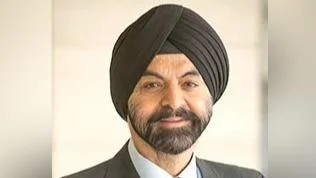Esteemed guests, partners, and colleagues, it is a privilege to be present here tonight. As we stand together, we celebrate the spirit of women entrepreneurs and acknowledge the leaders who echo the World Bank Group's commitment to fostering diversity and inclusion within supply chains—a commitment that resonates deeply with all of us.
Tonight's gathering is not just a celebration but also an acknowledgment of the tireless spirit of women entrepreneurs. Their resilience and ingenuity are the cornerstones of our shared future—a future to which the World Bank Group is deeply committed. This future envisions diversity and inclusion as essential pillars of our global economy, rather than mere aspirations.
As we grapple with multiple crises, the importance of diversity cannot be overstated. The world's challenges are complex and demand bold, innovative solutions. To devise these solutions, we must draw from the full range of human potential, especially those too often left behind.
Merely acknowledging the value of diversity is insufficient; active support is imperative. The world cannot afford to sideline the talents and contributions of half its population.
This gathering serves as more than a ceremonial gesture; it acts as a catalyst for action. It provides a forum where we can share not only our achievements but also our challenges with candor. In doing so, we can chart a path forward with renewed energy and clarity.
The World Bank Group commits to inclusivity in every aspect of our work—from supporting client countries to managing our internal operations.
Across our five World Bank Group institutions, we focus on our renewed vision of ending poverty on a livable planet. Through financing and expert advice, we empower nations and communities. We assist them in enacting meaningful change to improve their citizens' lives and pave the way towards a more equitable world. Our advocacy extends beyond financial support—we champion marginalized groups by dedicating resources to job creation and opportunities that bring hope for their future. In this way, gender equality and women's economic empowerment remain at the forefront of our mission.
Our conviction is steadfast. Achieving our vision requires the full economic participation of both men and women. Gender equality is not just a moral imperative; it serves as a catalyst for societal change and well-being across generations.
The evidence is clear—when women are involved, the likelihood of lasting peace increases, economies thrive, and the environment benefits. From Sri Lanka to the Philippines, I have witnessed firsthand the powerful impact that empowering women can have.
Starting and scaling a business provides a potent mechanism for women to break free from poverty and build brighter futures. The COVID-19 crisis has only magnified this significance by disproportionately affecting women and girls, thereby increasing inequality and violence against them.
At the World Bank Group, we recognize procurement's power. Supply chains are not merely economic linkages—they serve as channels through which we can exert positive, sustainable impacts. By championing diverse and inclusive supply chains, we create opportunities for employment, entrepreneurship, and leadership, particularly for economically marginalized individuals, including women.
Our ambition on supplier diversity extends beyond internal policy—it represents a pledge to lead by example. This commitment permeates our work with developing countries and our internal affairs management.
In 2018, we initiated a comprehensive supplier diversity and inclusion program. We set a target to double our procurement from women-owned businesses to 7% by 2023—a goal we celebrate achieving today while setting even higher targets for the future.
We aim to increase our procurement from women-owned businesses to 12% and elevate their representation among our vendors from 9% to 15% by 2030.
We also commit to quantifying our supplier diversity efforts' economic impact with an emphasis on job creation, wage enhancement, and tax revenue contribution. Drawing from our work with minority-owned businesses in the United States, we plan to expand globally to support businesses owned by those who have faced racial discrimination. Furthermore, we intend to broaden our support to include other diverse supplier groups such as SMEs, disabled- and LGBT-owned businesses.
Our supplier diversity and inclusion efforts form part of a larger vision integral to the World Bank Group's identity and our new Gender Strategy. This strategy will guide our engagement using innovation, financing, and collective action to:
Firstly, end gender-based violence and elevate human capital,
Secondly, expand and enable economic opportunities for women, and
Thirdly, engage women as leaders.
As we hold ourselves accountable for gender equality outcomes, we also call upon our clients, partners, and peers to join us in this commitment. Through partnerships, we can amplify our impact, share knowledge, and find common solutions. Together, we can set a precedent for gender-responsive procurement and demonstrate the transformative power of every contract.
I extend my gratitude to Elizabeth and WEConnect International for their dedication to gender-responsive procurement. I also want to thank all the women entrepreneurs who represent the transformative power of their work. Your commitment further advances progress.
Thank you all for the opportunity to address you this evening. I look forward to the discussions that will emerge from tomorrow's seminar. I am confident that together we will forge a path towards a more inclusive and prosperous world.
Thank you.

